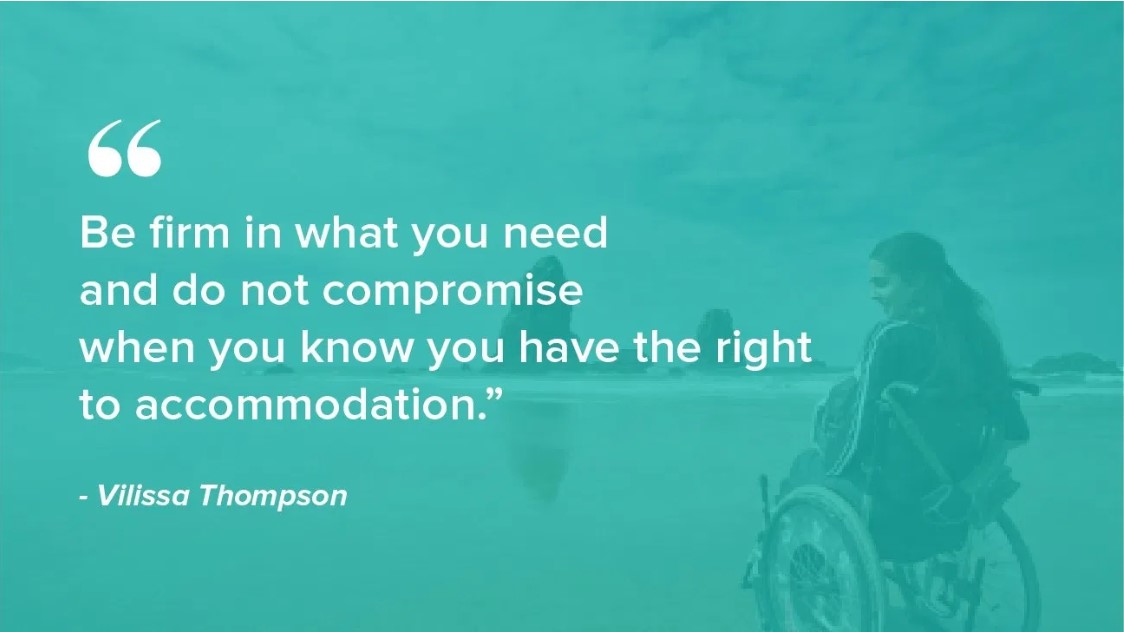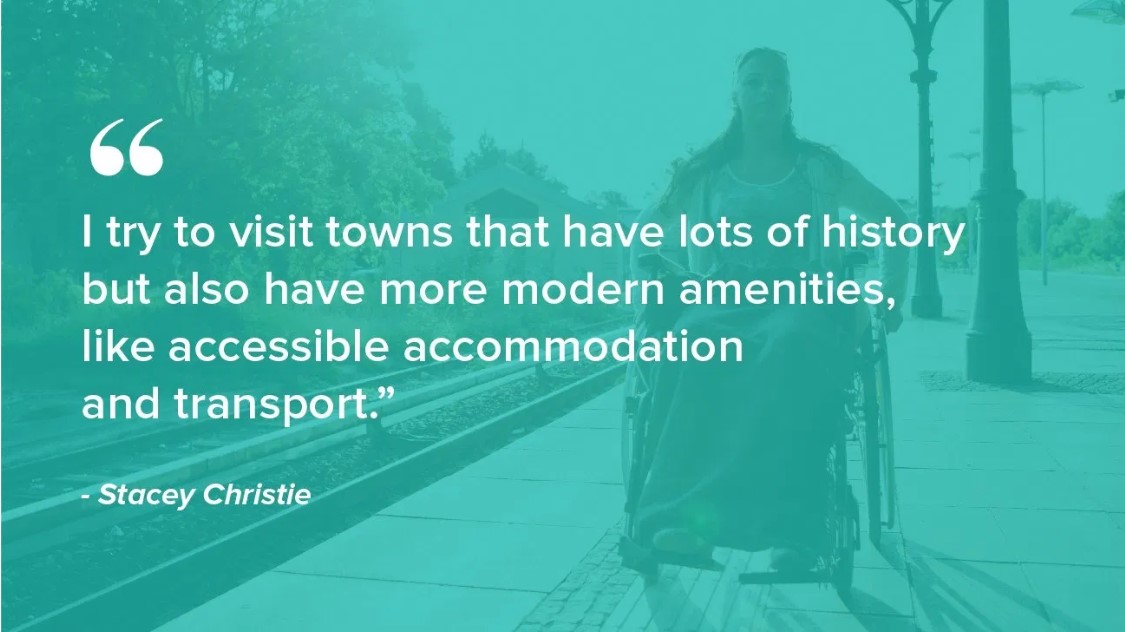There’s nothing quite like putting your out-of-office message on and silencing your phone as you get ready to embark on that much-deserved vacation. Of course, to make your trip successful, there’s a certain level of basic preparation that goes into it, like booking airfare and accommodation to ensuring you have both your passport and any necessary visas. While this might sound stressful, for those within the disability community, the prospect of travel comes with its own added layer of planning.
This can include everything from ensuring the destination has wheelchair-accessible public transportation and an accessible bathroom in your booked hotel room to planning in case the airline misplaces or damages your mobility device.
To shed some light on what it’s like to travel with a disability, we asked three experienced travellers with disabilities to share their own experiences and tips. Here’s what they had to say.
Abilities vary from person to person, and the advice and anecdotes below aren’t relevant to everyone. This interview has been edited for brevity, clarity, and length.
Vilissa Thompson

How do you prepare before setting out on a trip?
The first thing is getting my flight information, booking my plane ticket ahead of time, and, a few days before, making sure my booking is on record.
This way they know I’m a wheelchair user, that I use a manual chair, and that, to get on and off the aircraft, I’ll need an aisle chair and assistance to do so. If there are any seats closer to the front, I’ll also try to get one of those.
Also, one of the biggest things for me is to know how I’m going to get to and from wherever I’m going. This includes whether or not the airport has a shuttle or taxi, knowing what’s available works for me, and booking these means of transportation beforehand. If there’s no service like that, then I’ll use Uber.
What are the most important things for you when choosing a travel destination and corresponding accommodations?
In general, I like to make sure I know what’s available in the area I’m travelling to. Do they have public transportation? Because I’m someone who doesn’t currently drive, this is something I need.
I try to make sure the hotel I’m staying at knows, as early as possible, that I need an ADA-compliant room. I make sure they know I need a roll-in shower.
Sometimes there are also additional things I require, and so I make sure to let them know once I arrive. For example, there was one time I had to ask the hotel to make a change to my bed. Because I’m under 4 feet tall, to get onto the bed comfortably — hotel beds tend to be higher — I needed them to remove one of the mattresses on the bed.
Describe one or two travel lessons, tips, or tricks you wish you knew sooner.
Be firm in what you need and do not compromise when you know you have the right to certain accommodation.
And also, holding people accountable. Around October 2017, my wheelchair got lost when I was flying a particular airline, and I held them accountable to get it to me promptly. Luckily, I was stuck in a city where I knew people, and I was able to stay with a friend overnight.
I got another airline to give me their rental chair for that night until the morning, and I also made a fuss about it on social media to help get things moving. I feel that it was taken more seriously because I made a ruckus on social media.
Overall, I think using social media for that purpose is helpful. Not only do businesses not want bad publicity, but I think social media is key to help people outside of the disabled community understand that inaccessibility is still a really big issue, even though we [recently celebrated] the 28th anniversary of the Americans with Disabilities Act.
Where is your favourite place to travel?
I don’t think I have a favorite place at this point. But I did enjoy going to San Diego in April.
Cory Lee

How do you prepare before setting out on a trip?
I start planning trips about 6 to 12 months in advance, which is pretty far ahead. This allows me more time to research accessibility within the destination.
As a wheelchair user, it can take quite a while to find the perfect hotel, book accessible tours or transportation, and find out which attractions are accessible. Going on a trip spontaneously would be incredibly difficult, so I like to give myself plenty of time to prepare.
What are the most important things for you when choosing a travel destination and corresponding accommodations?
The first thing I research when planning a trip is accessible transportation within the destination.
If a city doesn’t have accessible taxis or public transportation, it would be impossible for me to get around in my powered wheelchair once I arrived. I would be stuck at the airport and wouldn’t be able to get to my hotel, so wheelchair-friendly transportation is a necessity.
I also like to choose destinations that are fairly easy to get to from my home airport in Atlanta. I prefer nonstop flights, as it lessens the risk of my wheelchair getting damaged and is just a lot easier. I will, however, do one layover if it’s somewhere I want to visit.
Describe one or two travel lessons, tips, or tricks you wish you knew sooner.
I wish I knew earlier in my travels to just go with the flow, so to speak. I used to get stressed out if something wasn’t going right.
Now, I’ve learned that eventually, everything will work out. Even if the airline damages my wheelchair, which is pretty much my worst-case scenario, it will be repaired. It may take a few days or longer, which isn’t ideal, but there’s no reason for me to stress over it. I can’t let a situation I have no control over ruin my mood.
Another thing I wish I did earlier is to study the Air Carrier Access Act (ACAA). A couple of years ago, I read the ACAA in full and learned so much about my rights when flying. It was an eye-opener, to say the least.
Where is your favorite place to travel?
This is such a tough question because I fall in love with every place I travel to. As far as being the most accessible though, Australia is fantastic!
When I visited Sydney four years ago, I was able to do absolutely everything I wanted. All of the public transportation, attractions, and restaurants were accessible. It was the first time I truly felt like I could do anything I wanted.
As for more recent travel, Morocco is a favorite. I visited in April, and it was unlike anywhere else I’ve been. I enjoyed seeing the snake charmers in Marrakech, eating tagine, and even riding a camel in the Sahara Desert. It was such an amazing trip in many ways.
Any products, tech, or app recommendations for travel?
I always travel with my Go Mobility shower chair, and it makes things a lot easier. It’s a shower and commode chair that can fold up into a suitcase, so it’s perfect to travel with.
Stacey Christie

How do you prepare before setting out on a trip?
Research! I always do a lot of research before travelling anywhere new. I make sure public transport is accessible and then I book wheelchair-accessible accommodation in a central location.
I also research what accessibility is like at the local attractions I want to visit before I go there. That way, I don’t have to try to figure out where the accessible entrances or disabled bathrooms are when I arrive at each destination, which can be challenging in a non-English speaking country.
Instead, I can simply enjoy my trip. For example, when I arrived at the Eiffel Tower, I was able to go directly to the accessible entrance because I’d already found out where it was by searching online ahead of time.
What are the most important things for you when choosing a travel destination and corresponding accommodations?
I love visiting towns that have a lot of history, but often they can be some of the least accessible places to visit. So, I try to visit towns that have lots of history but also have more modern amenities, like accessible accommodation and transport.
Venice is a great example! It has so much history, and with that comes a lot of old infrastructures. Though there are over 400 stepped bridges in Venice, they’ve installed ramps over some of them.
Many of the local water buses are also accessible, so I found it easy to get around in my electric wheelchair despite the age of the city.
Describe one or two travel lessons, tips, or tricks you wish you knew sooner.
Since starting my accessible travel blog last year, I’ve found so many other wheelchair users who are blogging about travel. Their blogs are amazing, and they share so much great advice about accessible travel. I wish I had discovered them sooner. I love being able to share travel experiences and learn from other wheelchair users.
Being able to save Google Maps areas onto my phone to use offline has also been a lifesaver. I downloaded maps of each city I visited in Europe and used them to navigate my way around, even when I didn’t have access to Wi-Fi. It was amazing. I literally would’ve been lost without it!
Where is your favourite place to travel?
I love London and all of Italy. They’re so full of history, architecture, and art — everything I love.
New Zealand will always have a special place in my heart, too, because that’s where I grew up and that’s where my family lives. It’s also amazingly beautiful and the people are wonderful.
Any products, tech, or app recommendations for travel?
I have a custom-made suitcase holder, which sits on the back of my wheelchair. It’s invaluable, as I can carry my suitcase independently. I traveled around Europe solo last year, which is something I wouldn’t have been able to do without the suitcase holder to carry my suitcase on the back of my wheelchair.
Source: https://www.healthline.com/health/tips-for-traveling-with-a-disability
































